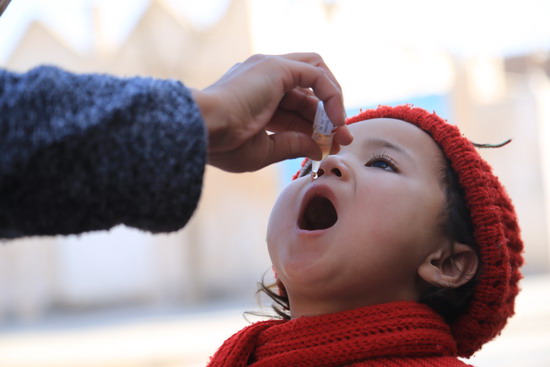 Setayesh, 4 years old. Jebrail, Enjil district, Herat province. Photo: Ramin Afshar/WHO Afghanistan
Setayesh, 4 years old. Jebrail, Enjil district, Herat province. Photo: Ramin Afshar/WHO Afghanistan
Kabul, 29 March 2021 – The second national polio immunization campaign of 2021 was launched today by the Ministry of Public Health of Afghanistan, in collaboration with UNICEF and the World Health Organization (WHO). Approximately 9.9 million children under the age of 5 will be targeted against polio during the 5-day campaign across the country except for a few areas due to extreme weather conditions or security-related access restrictions. A supplementary dose of vitamin A will also be administered to children aged 6 to 59 months during this campaign. This will help build general immunity among susceptible children to protect them from polio and other diseases.
 Setayesh, 4 years old. Jebrail, Enjil district, Herat province. Photo: Ramin Afshar/WHO Afghanistan
Setayesh, 4 years old. Jebrail, Enjil district, Herat province. Photo: Ramin Afshar/WHO Afghanistan
Kabul, 29 March 2021 – The second national polio immunization campaign of 2021 was launched today by the Ministry of Public Health of Afghanistan, in collaboration with UNICEF and the World Health Organization (WHO). Approximately 9.9 million children under the age of 5 will be targeted against polio during the 5-day campaign across the country except for a few areas due to extreme weather conditions or security-related access restrictions. A supplementary dose of vitamin A will also be administered to children aged 6 to 59 months during this campaign. This will help build general immunity among susceptible children to protect them from polio and other diseases.
"Although intense efforts are ongoing to eradicate polio, the continued Taliban-imposed ban on house-to-house polio vaccination campaign in some areas of the country has led to immunity gaps among children, making it difficult to interrupt polio transmission,” said Dr Wahid Majrooh, the acting Minister for Public Health. “Approximately 3.3 million children in the areas where these bans exist are repeatedly being deprived of the polio vaccine in each round of the campaign, which has caused an increase in polio cases across the country, especially circulating vaccine derived polio virus (cVDPV) type-2. If our vaccinators and health workers are able to reach every child, we can control and eradicate polio in a short period of time," expressed the acting Minister for Public Health.
Without access to children in areas that have remained unreachable by the programme for extended periods of time, it will be difficult to stop polio outbreaks. “WHO is increasingly concerned about the declining immunity against polio in populations in areas where house-to-house campaigns remained banned,” said Dr Dapeng Luo, WHO Representative in Afghanistan. “All parties must respect the neutrality of health interventions. Unimpeded access to reach children with critical vaccinations and other essential health services is the only way to stop polio and other outbreaks,” he added.
In 2020, a total of 56 polio cases caused by wild poliovirus type 1 and more than 300 cases of cVDPV type 2 were reported. So far, in 2021 one case caused by wild poliovirus type 1 and 23 cases of cVDPV type 2 have been reported in predominantly inaccessible areas of the country.
Existing disruptions to critical immunizations caused by active conflict and bans on polio campaigns in certain parts of the country, have delayed up to 5 rounds of polio vaccination campaigns. However, the programme remains committed to finishing the job and is continuing to innovate to overcome challenges. Despite hurdles caused by the COVID-19 pandemic and insecurity, more than 7 400 000 doses of the polio vaccine have been administered in 2021.
"Under the leadership of the Ministry of Public Health, UNICEF is committed to eradicating polio in Afghanistan and giving every child the best start in life,” said Alice Akunga, UNICEF Deputy Representative. “We are pleased that this week, the second polio campaign of 2021 will begin across the country – not only vaccinating children against the scourge of polio but boosting their immunity against other diseases through providing vitamin A supplements,” expressed, UNICEF Deputy Representative.
Currently, Afghanistan and Pakistan remain the only 2 polio-endemic countries in the world. The Government, WHO, UNICEF and health partners are urgently calling for a combined effort to ensure safe access to vaccinate all children in difficult and conflict-prone areas. Every Afghan has a role to play in ending polio in Afghanistan.
For more information:
Merjan Rakesh
Communications Officer,
NEOC Ministry of Public Health of Afghanistan
Email:
phone +93 0702825101/ +0788412525









